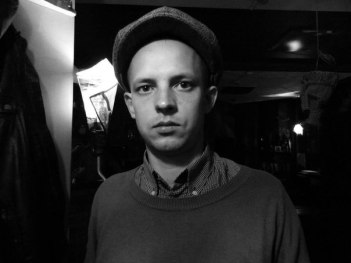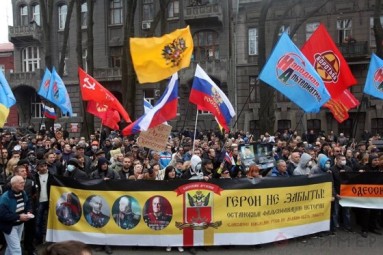 |
| Workers’ meeting at Svetlodarsk hospital |
Reposted with permission from People and Nature, translations by Gabriel Levy. This report confirms what I reported at the weekend, that the potential for 'counter revolution' inside the Donetsk and Luhansk 'republics' is the reason why international aid agencies have been expelled - a situation which started from their treatment of trade unions.
Pavel Lisyansy, founder of the Eastern Human Rights Group and lawyer for workers in eastern Ukraine, gives his view in this guest post of efforts to strengthen the labour movement at a time of military conflict and attacks on workers’ rights.
===
In 2015 breaches of Ukrainians’ social, economic and labour rights are becoming sharper and sharper. Politicians from oligarchic clans have started shouting about a social and economic revolution. And really, we have had two political revolutions – the “Orange revolution” [of 2004] and the “revolution of dignity” [of 2014] – but there has been no social and economic revolution.
In Ukraine there is a huge potential for protest, due to the widespread breaches of labour rights. There is a great need for new trade union and working-class organisations. Since Soviet times the trade union movement has not modernised itself. Trade unions have remained as they were: “distributors of holiday vouchers” and “lobbyists for the employers” in workplace collectives.
[Translator’s note. During the Soviet period, up to 1991, workplace trade union organisations functioned as a branch of management, ensuring collaboration with labour discipline. Workers appreciated them only for distributing vouchers for holiday trips and canteen meals, and other minor benefits.]
So far, the grass-roots trade union organisations are not numerous, and can not offer the sort of resistance to the oligarchs that is needed.
And there is an attack on workers’ rights along all fronts: the adoption of a new labour code, an increase in communal tariffs [for rent, electricity, gas, water, housing repairs, etc], and a mass of illegal sackings and lay-offs. To resist this offensive needs a new algorithm of trade union and workers’ struggle.
The most difficult situation with regard to working people’s rights is in the east of the country where the military conflict is going on. There, working-class resistance is completely absent. If employers don’t pay wages, they say: “there’s a war on. What the hell do you want?” But it’s exactly in eastern Ukraine that new trade union organisations are being formed, among workers who have lost all hope of anyone helping them, who are compelled towards self-organisation in order to defend their rights. (In Svetlodarsk, for example.)
If those who are ready to defend workers’ rights work systematically, there is a very good chance that the east of the country could become one of the bases of a new workers’ and trade union movement.
Meanwhile, the trade union leaders are an object of great interest for premier-league politicians. But this is not driven by any intention of defending working people’s rights, but as an instrument of getting power.
The workers’ and trade union movement itself is going through the first stage of a new, young formation. In Ukraine there is a process by which young politicians are appearing and old ones are leaving the scene, and there’s a corresponding process in the unions. But the trade unions’ “old guard” doesn’t want to leave its “place in the sun”, and so it is offering all kinds of resistance to initiatives from young activists. A gigantic amount of energy is used up fighting these internal battles, and the defence of labour rights gets forgotten.
The younger generation’s lack of trade union experience is a problem. In the grass-roots organisations, 80% of the young activists don’t have experience of the ins and outs of working class and trade union struggle. And that’s in the first place on account of the failures of the older trade union leaders, who are afraid of competition and – motivated by jealousy, greed and cowardice – “get rid of” their younger competitors. All this serves to knock the workers’ movement in Ukraine off course.
This is the time to hammer out new methods of struggle for working people’s rights. Time doesn’t stand still. New information and other technologies develop. It’s time to use the potential of young activists to counter the oligarchic clans.
 |
| Workers’ meeting at Amstor supermarket, Severodonetsk, 27 September |
Pavel Lisyansky regularly posts information about the workers’ movement in eastern Ukraine on his Facebook page (Russian only). Here Gabriel has translated a couple of interesting recent posts.
Pay scandal in Severodonetsk supermarket
27 September 2015. Today there was a meeting of the workplace collective at the Amstor supermarket in Severodonetsk. The situation there is appalling. The company owes workers pay for previous months; it refuses to release workers who want to leave; and it has failed to pay holiday pay. People continue to go to work and to demand that their elementary rights. In the building where they work light, water and the internet have been cut off. But they continue to go there, so that they can not be dismissed for failing to turn up.Today [some other activists and myself] helped the workers to organise themselves. The workplace collective has formed a rank-and-file trade union organisation. From next week we will begin systematic work on the defence of labour rights. The newly-formed trade union has already sent an appeal to Artur Palatny, head of the parliamentary committee on families, youth and sport.
People are protesting in the centre of Severodonetsk (which is currently the administrative centre of Lugansk region [i.e. on the Ukrainian side of the front line – trans.]), where a range of international and civic organisations are based and where senior politicians turn up every week. But no-one reacts to the outrageous situation facing workers.
New rules for organisations in the Lugansk “republic”
25 September 2015. A source in the state security ministry of the LPR [Lugansk People’s Republic] has told me that the problems facing international organisations in the territories not under Ukrainian control is a new planned strategy, directed at external dangers and internal threats.All this started with the trade union movement. More than a year ago, the “republics” thought up a procedure of re-registration, and then set about forming one united union [i.e. excluding those who didn’t register – trans].
Then they moved on to persecuting international organisations such as the Red Cross, Doctors Without Borders, the United Nations, the Salvation Committee [set up in Moscow in July by representatives of the Party of Regions], etc.
The source in the state security ministry said that a decision has been taken to constrain the activity of such international organisations in view of the danger they are said to present of counter revolution inside the “republics”.
Mineworkers’ day
29 August 2015. Tomorrow is the Mineworkers’ day! [A traditional industrial holiday that started in Soviet times – trans.] For my family, it’s an important day. My great-grandfather, grandfather, father and me were all mining engineers and consciously put our efforts into the mining industry.I have seen the pits from every angle – as a worker (from the age of 15 I worked every summer as an ordinary miner), as a manager (in which capacity I worked, starting from shift leader to acting mine manager at the time of the military conflict in the summer of 2014 near Debaltsevo), and also as a trade union activist (I was the first in Donbass to set up an independent union organisation of students at the mining university, and when I went to work I joined the Independent Mineworkers Union of Ukraine).
In the coal industry there are many honourable and decent lads, including managers with whom I have been lucky to work. And there are many honourable trade union leaders – not those who sit in Kiev, but those who are to be found at the workplaces – who with their ideologies have earned industrial honours (Miners’ Pride awards, etc) and given their life to the pits.
But unfortunately there are also those who have earned themselves billions of dollars with these ideologies, and also those who have profited from the business of defending miners’ social and economic rights, and who have really played the role of protector for bosses of the highest rank. The bosses name their price, give the order “forward march” … and off goes the “defender of the workers” to the mass media, to defend the interests of a particular boss or particular financial-industrial group.
Real trade union leaders don’t live in Kiev and don’t drive around in fancy jeeps. They take the collectives to work, to produce coal, at this difficult time. And their reward is their wages and industrial awards, and not handouts and payments from oligarchs! Having seen since I was young the labour of real miners, and made my choice, I am following in my dad’s footsteps!
Congratulations to all the mineworkers in Ukraine, from Lugansk [in the east] to Lviv [in the west] on our day!
Afterword by Gabriel Levy
A year ago, I argued that war and military conflict in eastern Ukraine are “a means of social control” that have “disastrous impacts on social and labour movements”, producing “a new type of hierarchy – of the armed against the unarmed” that reinforces other social hierarchies. Pavel Lisyansky’s article suggests to me that all that still holds true – but also that there is another side of the story: the activity by him and many others directed at resuscitating and rebuilding the workers’ movement at grass roots level. Such efforts deserve support from social and labour movements all over Europe.About the photos
The top photo shows the founding meeting of a new trade union organisation at the Svetlodarsk city hospital. Every single employee at the hospital has joined the new organisation. Pavel Lisyansky is on the left, sitting at the desk. The second photo is of a meeting at the Amstor supermarket in Severodonetsk, described in Pavel’s Facebook post of 27 September.Also on People & Nature:
- Workers’ solidarity in wartime: Bosnia 1993, Ukraine 2015
- NUM solidarity with besieged Ukrainian miners
- People & Nature site contents
- For information on the workers’ movement in Ukraine see also the Observer Ukraine blog, the Ukraine Solidarity Campaign site and the Ukraine Activist Perspective Facebook page.
See also:
- Marko Bojcun on slavery in the “DNR” and “LNR”
My posts:
- Donbas can starve say 'rebel' leaders
- Ukraine has a new left party
- A socialist take on the Maidan, and after
- The left's Russia naivete























